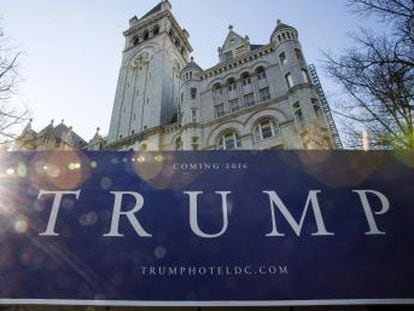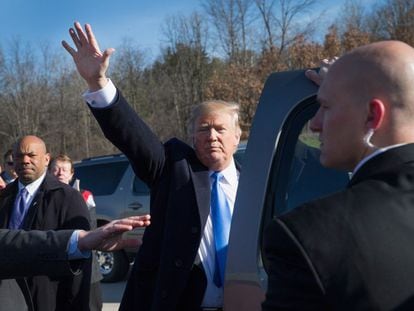Donald Trump’s foreign policy in two words: “America First”
Likely Republican presidential candidate presents leadership credentials in Washington speech


Should Donald Trump take the Republican Party’s nomination in July, and then go on to win the November elections, US foreign policy would likely take an isolationist turn. Echoing the slogan used in the 1940s by aviation hero Charles Lindburgh, who campaigned against the United States entering World War II, Trump fleshed out what his administration’s priorities might be in a speech on Wednesday evening in Washington, in the process attempting to establish his leadership credentials.
Even six months ago, such a scenario would have been unthinkable. Now, somebody best known by the public for his appearances on reality shows and his divorces has a very real chance of occupying the White House and serving as commander in chief of the armed forces – the man with his finger on the nuclear button.
In short, what might be called the Trump doctrine seems to come down to militarist isolationism
“Today, our foreign policy is a complete and total disaster,” said Trump, describing the United States as a country that neither its friends nor enemies respect.
The Trump camp had suggested ahead of the speech that Wednesday’s event in the Mayflower Hotel would mark a turning point, reflecting a more presidential candidate. But Trump’s address was made up of his usual mish-mash of populist rhetoric and soundbites. If his intention was to overcome the skepticism of the Washington elite he has so vigorously criticized in recent months, he failed.
His foreign policy objectives seemed contradictory: requiring an aggressive approach combined with a strategic withdrawal from conflicts in Iraq and Afghanistan. He criticized the United States’ NATO allies for cutting defense spending, and threatening to leave them unprotected; he then said he was keen to improve relations with China, Russia and Washington’s traditional Arab allies.
In short, what might be called the Trump doctrine seems to come down to militarist isolationism. The speech was organized by the Center for the National Interest, a think tank founded by Richard Nixon that describes its role as providing “a voice for strategic realism in US foreign policy.” Henry Kissinger and Brent Scowcroft sit on its board.
Trump kicked off his address by dismissing the goal of reforming countries “with no experience or interest in becoming Western democracies”
Trump kicked off his address by dismissing the goal of reforming countries “with no experience or interest in becoming Western democracies.” He also accused Washington of complacency toward its European allies, while complaining that traditional friends such as Israel no longer trust the United States because President Obama has “abandoned” them in favor of Iran. He also promised to overthrow the so-called Islamic State, saying that “its days are numbered.”
China, meanwhile, is taking advantage of the United States’ failure to lead by launching an “attack on American jobs and wealth.” He didn’t mention Mexico, which has long been a target of his attacks, instead blaming the North American Free Trade Agreement (NAFTA), which includes Canada and Mexico, for the country’s industrial decline.
Trump’s America First doctrine applies above all to diplomacy and trade, based on highly protective policies and an end to what he called “putting other countries’ interests first,” adding: “No country has ever prospered that failed to put its own interests first. Both our friends and enemies put their countries above ours and we, while being fair to them, must do the same. We will no longer surrender this country, or its people, to the false song of globalism.”
Isolationism and realpolitik have deep roots in the US political right wing, but have been largely absent from policy in recent years, with the Republican Party largely associated with interventionism. Some of the party’s better known neo-cons, who were advisors to former president George W. Bush in the run up to the 2003 Iraq invasion, have suggested they might vote for Hillary Clinton.
A delicate balance
Trump’s speech did nothing to reach out to the Republican establishment. Little wonder: he has achieved his goals precisely by dismissing most of its traditional ideas and insulting some of its most senior figures. In turn, the party’s leadership is horrified at the prospect of somebody it sees as a populist demagogue with no experience in office, and whose racist, misogynist rhetoric could well turn a significant percentage of voters away from the party come election time in November.
That said, nobody can deny Trump’s ability to connect with the Republican Party’s grassroots over domestic and foreign policy issues. After almost two decades of failure in Iraq and Afghanistan, the United States is tired of war. Free trade is associated in many people’s minds with unemployment, relocation, industrial decline, and low wages. In short, Trump has managed to articulate the fears of blue-collar and working class taxpayers, ignoring Republican dogma in the process.
An eventual President Trump would suppose a break not just with the Republican Party, which has traditionally been hawkish, but also with US foreign policy. The most hawkish candidate come November will likely be Hillary Clinton.
English version by Nick Lyne.
Sign up for our newsletter
EL PAÍS English Edition is launching a weekly newsletter. Sign up today to receive a selection of our best stories in your inbox every Saturday morning. For full details about how to subscribe, click here.












































